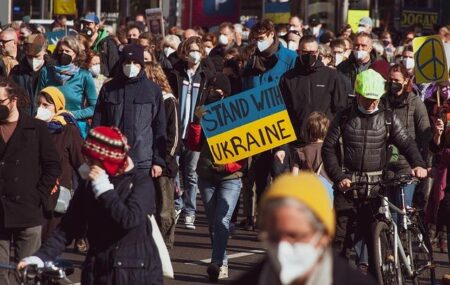The European Union is intensifying financial pressure on Russia in a strategic effort to bring about peace in Ukraine through economic strength. In a series of escalating sanctions and targeted measures, Brussels aims to weaken Moscow’s war capacity and compel a diplomatic resolution amid the ongoing conflict. This approach, framed as “peace through strength,” underscores the EU’s commitment to supporting Ukraine while leveraging economic tools to influence Russia’s actions.
EU Intensifies Financial Sanctions Targeting Key Russian Sectors to Undermine War Effort
The European Union has escalated its economic pressure on Russia by unveiling a new wave of financial sanctions aimed squarely at crippling pivotal sectors that fuel the Kremlin’s military operations. This latest package includes stringent measures targeting Russia’s oil exports, banking institutions, and key industrial enterprises, effectively narrowing the country’s access to vital foreign currency reserves and international financial markets. Officials emphasize that by cutting off these economic lifelines, the EU intends to significantly reduce Russia’s capacity to sustain its war effort in Ukraine.
Key components of the sanctions include:
- Restrictions on Russian state-owned banks’ access to SWIFT and international payment systems
- Ban on imports of critical oil products and refined fuels from Russia
- Freezing assets of leading industrial corporations linked to defense production
- Enhanced monitoring of illicit financial flows aimed at circumventing sanctions
| Sector | Impact | Expected Outcome |
|---|---|---|
| Energy | Oil export limitations | Decrease revenue by 30% |
| Finance | SWIFT access revoked | Financial isolation |
| Industry | Asset freezes | Disruption in arms supply |
EU leaders reaffirm that this strategic economic pressure serves as a crucial leverage tool, pushing Russia towards reconsidering its aggressive stance. However, they acknowledge the need for sustained international coordination to close loopholes and to ensure compliance across member states. The move reflects a broader commitment to achieving “peace through strength,” by using financial influence as a weapon to restore stability and uphold international law in the region.
Impact of EU Economic Measures on Russia’s Military Capabilities and Domestic Stability
EU-imposed economic sanctions have significantly curtailed Russia’s ability to finance its military operations, introducing a critical bottleneck in the Kremlin’s war efforts. Targeting key sectors such as energy exports, banking, and access to international capital markets, these restrictions have limited Moscow’s cash flow, forcing a strategic recalibration of military budgets. The pressure is evident as reports emerge of delayed equipment deliveries and scaling back of offensive operations, signaling the tangible cost of the EU’s financial squeeze on Russia’s defense supply chain.
Domestically, the ripple effects of economic hardship have stirred growing unease among the Russian populace. Inflation spikes, escalating unemployment, and shortages of consumer goods are straining social stability and testing public tolerance. Key impacts include:
- Decreased real income and purchasing power for middle-class families
- Rising discontent in urban centers critical for political control
- Heightened risk of unrest and challenges to state authority
| Sector | Pre-Sanctions Revenue | Revenue Drop (%) |
|---|---|---|
| Energy Exports | $150 billion | 35% |
| Banking & Finance | $70 billion | 40% |
| Defense Manufacturing | $45 billion | 28% |
Expert Recommendations for Enhancing EU Coordination and Sustaining Pressure for Lasting Peace
To maximize the European Union’s role in steering Ukraine towards a durable peace, experts emphasize the importance of deepening coordination among member states through transparent intelligence sharing and aligned diplomatic initiatives. This includes establishing a centralized EU task force dedicated to monitoring economic sanctions’ effectiveness and adjusting strategies in real time. Moreover, strengthening partnerships with international bodies such as NATO and the UN will amplify pressure on Russia while preserving the EU’s unified stance.
Equally crucial is maintaining sustained economic and political pressure without causing undue hardship to EU member states or their populations. Experts suggest an adaptable sanction framework that targets key financial chokepoints while fostering resilience within European markets. The table below outlines essential elements for enhancing EU coordination and sustaining pressure:
| Focus Area | Recommended Actions |
|---|---|
| Coordination | EU task force, intelligence sharing |
| International Alliances | Collaboration with NATO and UN |
| Sanctions Strategy | Targeting financial sectors, adaptive sanctions |
| Economic Resilience | Support to EU markets, mitigating collateral damage |
To Conclude
As the conflict in Ukraine continues to reshape geopolitical dynamics, the European Union’s strategy to apply financial pressure on Russia underscores its commitment to achieving “peace through strength.” By targeting key sectors of the Russian economy and imposing stringent sanctions, the EU aims to curtail Moscow’s ability to sustain its military operations. While the full impact of these measures remains to be seen, the bloc’s coordinated financial crackdown signals a steadfast resolve to influence the course of the war and support Ukraine’s sovereignty. The coming months will be critical in determining whether this economic pressure can help pave the way toward a diplomatic resolution.



